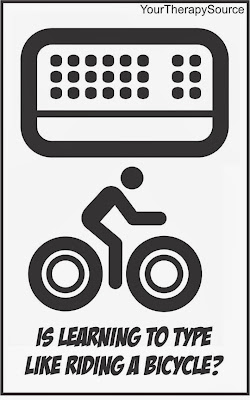Is Typing Like Riding a Bicycle?
Attention, Perception & Psychophysics has published research on skilled typists and the QWERTY keyboard. The 100 participants (young adults and adults) in the study were asked to complete a short typing test. Following the typing test, the participants were given a blank QWERTY keyboard on a piece of paper where they had 80 seconds to write the correct letters on the blank keyboard. The results showed the following:
- they averaged typing 72 words per minute, moving their fingers to the correct keys six times per second with 94 percent accuracy.
- they could accurately place an average of only 15 letters on a blank keyboard.
The researchers had expected that the participants would be able to type without conscious thought (like riding a bicycle and driving a car). Although the researchers were surprised that typists never appear to memorize the key positions, not even when they are first learning to type.
A second study was completed using the Dvorak keyboard. The 24 skilled QWERTY typists had to learn how to type on the Dvorak keyboard. After a reasonable accuracy rate was established, the typists were asked to fill out a blank Dvorak keyboard. On average, the typists were able to identify 17 letters on the blank keyboard.
The researchers concluded that the “lack of explicit knowledge of the keyboard may be due to the fact that computers and keyboards have become so ubiquitous that students learn how to use them in an informal, trial-and-error fashion when they are very young”.
Interesting research to take into account when teaching keyboarding. Have you ever tested to see what letters a student could actually identify on a blank keyboard? This is a skill that we attempt to break down when teaching and we include memorizing where the keys are located. When neurotypical individuals are learning to type is it purely through practice and use? In your opinion, does learning to type require a conscious effort at first and become automatic over time?
Reference: Salisbury, D. Study gives new meaning to ‘let your fingers do the walking’. Medical Express. Retrieved from the web on 12/9/13 at http://medicalxpress.com/news/2013-12-fingers.html#nwlt.


Comments are closed.